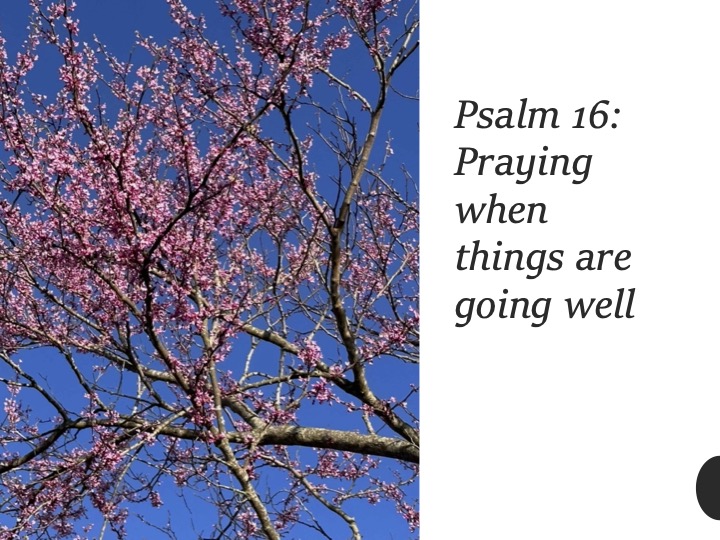Jeff Garrison
Bluemont and Mayberry Churches
April 16, 2023
Psalm 16
At the beginning of worship:
How do we learn to pray? How do we learn to talk to God? Last fall, I spent six weeks looking at the Lord’s Prayer, which is one way we can learn the patterns of prayer. But another tool we have from scripture to teach us to pray are the Psalms. I will spend the next sixth Sundays that make up the Easter season looking at six different Psalms.
Eugene Peterson in his helpful book Answering God: The Psalms as Tools for Prayers, reminds us that while prayer is a human tool, it’s not a tool for “doing or getting, but for being and becoming… God uses prayer to work his will in our bodies and souls. Prayers are also the tools we use to collaborate in God’s work with us.”[1] And it’s in the Psalms, which touch on all human experiences and emotions, that we learn how to go deeper in our prayer life.
Before reading the Scripture:
As this is the second week of Easter, I’ll begin our exploration of the Psalms with the 16th. In the early church, this was an important Psalm. Both Peter and Paul use it in their sermons as a reference to the resurrection found in the Old Testament.[2] The Psalm is attributed to David. Now I am not going into the details of whether David was the actual author, or his name was just attached to the Psalm. We can’t prove either. I will refer to the author as either David or the Psalmist.
In the title, we’re told this Psalm is a Miktam of David.[3] The problem is that one knows what “Miktam” means. The Reformer Martin Luther suggests it may mean “a golden jewel.”[4] Whether or not Luther is right about the translation of this word, he is right about this psalm. It’s a golden jewel.”
Read Psalm 16
This Psalm can be divided into three parts, and we might use this breakdown in our prayers.
Part 1:
First, the Psalm begins with a petition for God’s protection. Unlike many of the Psalms, we don’t know if something threatens the Psalmist. In Psalm 17, also attributed to David, informs us of the wicked who despoil him and the enemies who surround him. But here in the 16th Psalm, we’re not provided any indication David is surrounded by enemies or threatened in any way. Instead, he takes comfort in God, because of his relationship to God and what God has done for him.
You know, we don’t have to be threatened to call out to God in prayer. Of course, God wants us to bring our concerns to him. When endangered, we may cry out, “Help me, God.” That’s okay. Jesus prayed intently in Gethsemane when troubled.[5] But we can, and should, also pray to God, confessing our trust in the Almighty. On this Sunday after Easter, we may feel like things are going well for us and instead of ignoring God, we should give thanks.
The Psalmist not only takes refuge in God, but also acknowledges a good Calvinist view of life. “I have no good apart from God.” God, as Calvin often noted, is the fountain of all goodness.[6]
The Psalmist, in verse 3, also finds hope and delight in the “holy ones” or the others who trust God in his community. He’s not like Elijah, crying out to God saying I’m the only one left.[7] He has friends. Our faith is nurtured within a community, and it appears the Psalmists has benefited from such a group of people. Verse 2 in the Message translation reads this way, “And these God-chosen lives all around—what splendid friends they make!”
By the way, this is to be a goal of the church, to help people grow in their trust in God. We’re to encourage one another, as the Psalmist has been encouraged.
Of course, not everyone has the faith of the Psalmist. In verse 4, we learn there are those who have chosen another god (that’s god with a lower case “g”). They multiply their sorrows, and the Psalmist reaffirms his faith as he insists on avoiding their sacrifices. This Psalm comes from the Hebrew community, a people who were always surrounded by other nations that worshipped and sacrificed to other gods. But the Psalmists testifies that he will hold fast to the God of Israel and not chase after other gods who seem, at the time, to hold more promise.
Part 2
After seeking God’s protection and declaring his faith, the Psalmist moves into the second part of this Psalm where he speaks of why he is confident of God’s trust. To put this in the vernacular, he knows who butters his toast, or the hand that feeds him. God provides his substance and the land upon which he lives. As a good steward, he credits God for all he enjoys in life. He acknowledges he has a goodly heritage.
But God does more for the Psalmist than giving him a chuck of the Promised Land and food. He is attuned to what’s going on enough to know that God communicates with him through his conscience. For his part, the Psalmist always keeps God in front of him. Interesting, the Psalmist doesn’t mention obeying God’s law. His trust in God isn’t out of a fear of what God might do to him if he failed. Instead, he has a much more intimate connection with the Almighty. He must know that his hope isn’t in his actions, but in God’s.
I always pray before I fall asleep for the night. And during this time of prayer, I try to think back over the day and to see where I have experienced God and where I have struggled. Doing this and bringing my thanks and concerns to God right before sleep, puts me into a frame of mind that I might more easily hear God. It is amazing how many times I have woken up, sometimes at 4 AM, with a clearer view of what’s going on. But we must be open to the Almighty for us to experience such truths, as the Psalmist does.
Part 3
Our third section begins with verse 9. Having asked God’s protection and acknowledged God’s presence, the Psalmists rejoices in his hope discovered in a faithful life. His heart is glad, his soul rejoices, and he can rest secure. I suggest this is another reason to pray before bed. We fall asleep feeling secure in the God who neither slumber nor sleeps. God stays with us, day and night, Psalm 121 reminds us.[8]
Eugene Peterson reminds us that the end of prayer is praise.[9]Interestingly, the Book of Psalms ends with a series of “halleluiah Psalms.” Psalm 145 through 150 all begin with “Praise the Lord.” And here, at the end of Psalm 16, we find David praising the Almighty. Knowing God hears our prayers should be reason enough to pray.
Ironically, the Psalmist even finds comfort in the face of death. For the Psalmist, death isn’t just the opposite of life. Death implies we’re totally cut off from God, which is a reason to fear it. Being tossed in the pit, being forgotten, is scary. But the Psalmists knows God won’t abandon him. His hope is found in the promised presence of God. Life and joy go together.[10] God shows the Psalmist and us the path of life.
The God of the Psalmist
The God of the Psalmists is not the wrathful angry God we often think of from the Old Testament. No, this God is more like the shepherd leading us by the still waters and protecting us as we walk through the valley of the shadow of death.[11] But to experience such a God, we must try to know and to trust God. God sends Jesus to show us the way and then raised him from the grave, to give us hope, not just for joy in this life, but in the life to come.
Conclusion
So, what can you take from this Psalm? A reminder that even when things are going well, we should acknowledge that we trust, not ourselves, but God. Secondly, like the Psalmist, we should all strive to improve our communication with God. And finally, we should delight in God so that even at the grave we can sing “Alleluia.”[12] May it be so. Amen.
[1] Eugene H. Peterson, Answering God; The Psalms as Tools for Prayer (New York: Harper & Row, 1989), 2.
[2] Acts 2:31(25-31) and 13:35.
[3] Miktam psalms are all related to David. See Psalms 56-59. Leonard VanderZee, “Psalm 26 Commentary.” https://cepreaching.org/commentary/2018-11-12/psalm-16-2
[4] Artur Weiser, The Psalms: A Commentary, translated by Herbert Hartwell (1958 (German publication), Philadelphia: Westminster, 1962), 172, n.1
[5] Matthew 26:36ff.
[6] John Calvin, The Institutes of the Christian Religion, 1.2.1.
[7] I Kings 19:10.
[8] Psalm 121:4-5.
[9] Peterson, 121.
[10] James Luther Mays, Psalms: Interpretation, a Biblical Commentary for Teaching and Preaching (Louisville, KY: John Knox Press, 1994), 88.
[11] Psalm 23:3-4.
[12] One of the sayings that I use in the commendation in a funeral or at the grave uses this line, “All of us go down to the dust; yet even at the grave we make our song: Alleluia, Alleluia, Alleluia.” See Presbyterian Church USA, Book of Common Worship, (Louisville, KY: Westminster/John Knox Press, 2018), 793



You have me thinking, Jeff. I would never consider only talking to God when I want to ask for help. Really? I trust his plan so rarely ask for something–because I know he’s already doing it.
So that’s not normal?
I don’t know how many people actually only pray when things are difficult, but I think at such time prayer is our default position and at other times not so much.
A lovely sermon, Jeff. I have prayed every day for as long as I can remember. It mostly reminds to be grateful and to try and be a better human.
Prayer is so personal. It’s good to see that many of my readers are also prayers! Keep up the good work, Matt.
That was an enjoyable read. Thank you and I hope you have a good week.
Thanks, Mary. I hope you also have a good week.
Excellent sermon Rev. Thank you for great explanations and ur dedication.
Thanks, Anne. I hope you’re doing well.
I’ve grown to love and appreciate the Psalms in my older age.
I’ve never been good about practicing the “Daily Examen” before going to sleep, though I do try to focus on God.
I have always prayed before bed–it was something that went back to my childhood. Only later did I learn it was called “Daily Examen”. I, too, enjoy the Psalms
I’ve always prayed before bed, too… but just rarely do an “examen” to reflect on how God was present in and through my actions that day.